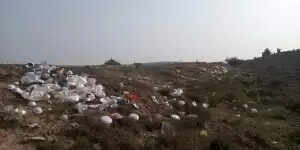Olive Ridley Turtles Hatch Amid Storm Challenges: A Closer Look
Mass Hatching of Olive Ridley Turtles Observed

Berhampur: On Monday, Odisha's Chief Secretary Manoj Kumar Ahuja observed the mass hatching of the endangered Olive Ridley turtles at the Rushikulya rookery in Ganjam district. This event, however, faced disruptions due to a thunderstorm that struck the region on Sunday evening.
Ahuja's visit followed closely after Governor Hari Babu Kambhampati had the opportunity to witness thousands of hatchlings emerging from their sandy nests and making their way to the ocean.
During his visit, the Chief Secretary engaged with local forest officials regarding the protective measures for the hatchlings and emphasized the need for increased surveillance as the second phase of mass hatching is anticipated next month.
Senior forest officials accompanied Ahuja during his inspection of the Olive Ridley hatching process.
The mass hatching, which commenced on Thursday, was impacted by the thunderstorm, causing a delay in the hatching process overnight. However, several baby turtles began to emerge from their nests early Monday morning, according to Sunny Khokkar, the Divisional Forest Officer (DFO) of Berhampur.
The DFO noted that the first phase of mass hatching is nearing completion, with millions of baby turtles having recently emerged from their eggs and heading towards the sea over the past five days.
"Counting the baby turtles as they crawl towards the ocean is quite challenging due to their large numbers," he remarked.
Forest officials are optimistic about a record number of hatchlings reaching the sea this season, as approximately 900,000 Olive Ridley turtles laid their eggs in the rookery during the two phases.
In the first phase of mass nesting, from February 16 to 23, 698,698 Olive Ridley turtles laid eggs along a five-kilometer stretch from Podampeta to Bateswar, while over 205,000 turtles participated in the second phase from March 22 to 27.
The second phase of mass hatching is expected to occur in the second week of next month.
Bibhas Pandav, a senior scientist at the Wildlife Institute of India (WII), assured that the eggs in the nests are unlikely to be adversely affected by the thunderstorm, as rainwater typically does not penetrate deeply into the sand.
